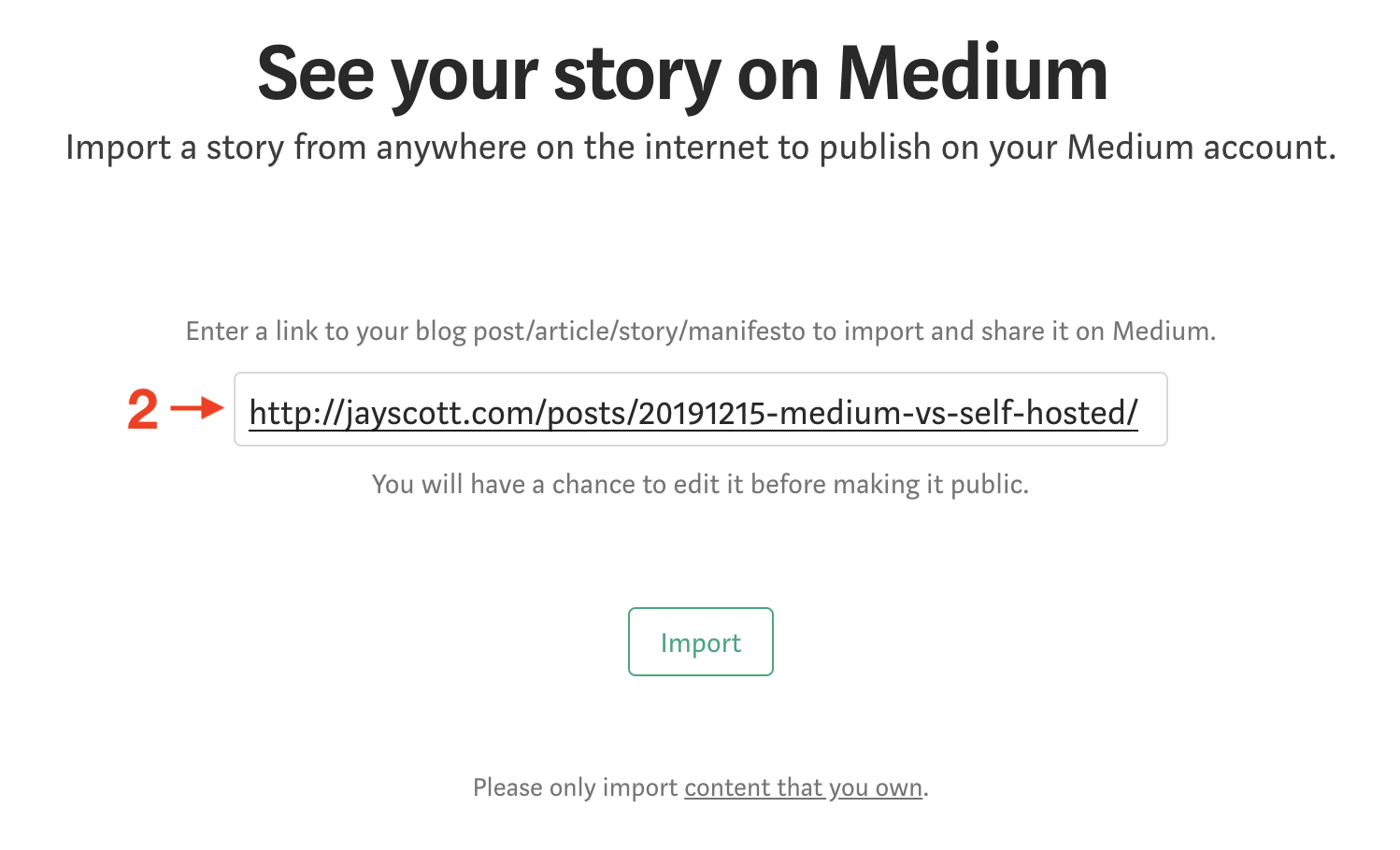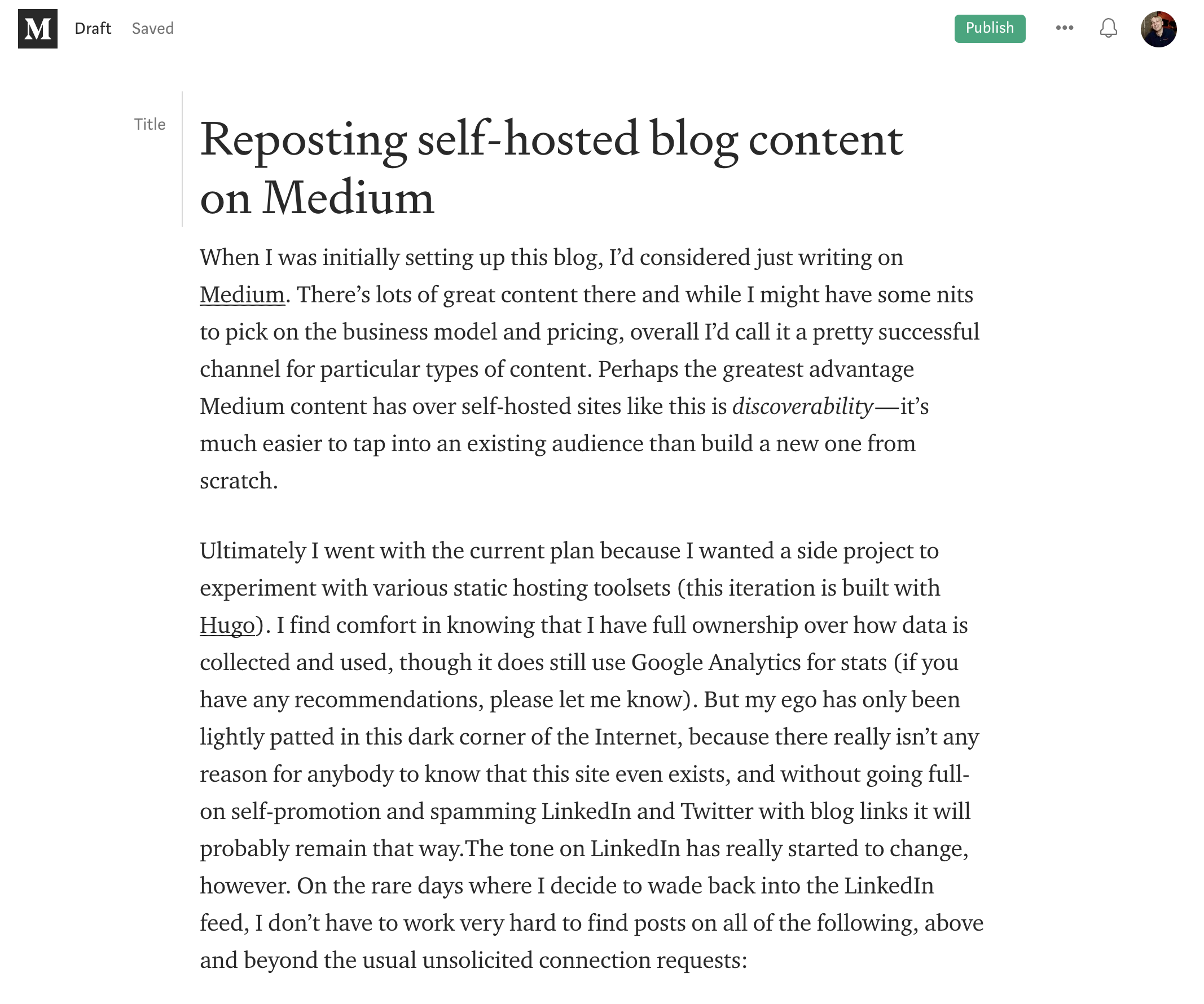Why crosspost blog content to Medium?
When I was initially setting up this blog, I’d considered just writing on Medium. There’s lots of great content there and while I might have some nits to pick on the business model and pricing, overall I’d call it a pretty successful channel for particular types of content. Perhaps the greatest advantage Medium content has over self-hosted sites like this is discoverability – it’s much easier to tap into an existing audience than build a new one from scratch.
Ultimately I went with the current plan because I wanted a side project to experiment with various static hosting toolsets (this iteration is built with Hugo). I find comfort in knowing that I have full ownership over how data is collected and used, though it does still use Google Analytics for stats (if you have any recommendations, please let me know). But my ego has only been lightly patted in this dark corner of the Internet, because there really isn’t any reason for anybody to know that this site even exists, and without going full-on self-promotion and spamming LinkedIn and Twitter with blog links it will probably remain that way.
As an experiment, I took a couple of my more thoughtful posts and threw them onto Medium. Here’s what happened:
- I doubled my page views in the first 24 hours.
- I earn (spammy) followers.
- I earned enough of a payout from the Medium Partner Program to pay for a month of hosting.
And so: I’m rethinking the relationship between this site and Medium content. I still don’t see any reason to be charging for anything, and will continue writing initially here, but will continue pushing larger “thought pieces” over to Medium after they’ve had a chance to bake. In the meantime, if you happen to have your own blog as well and have thought about crossposting to Medium, it’s really easy.
How to repost on Medium
First off, go register an account if you don’t already have one.
Next, in your user menu (upper-right corner): go to your Stories. Medium’s Import a story feature is quite easy – just paste in the URL of your post or content, and they will do their best to parse your page and import it into a new Medium draft.
Click the Import a story Button This is so meta

The importer is reasonably smart: it converts links, standard text formatting like italics and bold, and images. Medium’s editor formatting will probably be more restrictive than a Wordpress or Hugo site with custom templates and plugins and whatnot but in my experience it’s been 99% complete. After the import, you’ll be landed directly in the editor to make any final adustments.

Yet Another WYSIWIG Editor
Before smashing that Publish button, spend a few minutes thinking about (1) whether or not you want to monetize the content and (2) how you want to “market” the content. If you want to monetize, you’ll first need to register for the Medium Partner Program. It’s probably not going to make you rich, but it could be a useful motivator to continue writing.
Per statistics published by Medium, for June 2019:
- 55% of writers that opt-in to monetized content, earned money! Those are pretty good odds.
- 7.8% of active writers earned over $100 that month. That’s…well, that’s not super-exciting but it’s good to know you’ve got a shot.
- $13,577.33 was the most earned by a writer that month. So there’s your high-water mark.
What do you lose by crossposting to Medium?
Besides the obvious loss of additional time to actually do the crossposting work, any other sacrifices (for me, anyway) are mostly philosophical. You’ll be contributing content into somebody else’s data ecosystem, and you’ll only have control over how that data is activated to the degree that Medium decides to let you do that. This isn’t exactly an era of strong corporate trust when it comes to privacy and data security, but depending on your subject matter and the size of your current audience it may not be a huge risk.
You’ll also lose the opportunity to exclusively capture readers’ attention on a platform of your own design. I’d like to think that the typical Medium reader is more easily converted into a conversation or relationship, however, and that cross-promotion opportunities aren’t that hard to achieve.
The special case of corporate/business blogs hosted on Medium is one that I’m still conflicted about. I’ve seen some companies establish a presence on Medium and use that content to drive traffic to corporate or SaaS sites off-platform, and I’ve seen SaaS companies that prefer to keep that content directly hosted on their existing sites. I imagine it depends on the goal of the content: awareness-building, brand identity, user engagement, etc. So, as with all things, think about your goals before deciding on your tactics.
/JSA